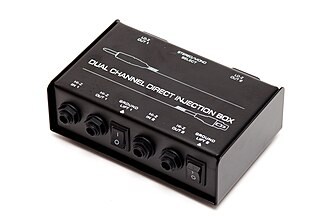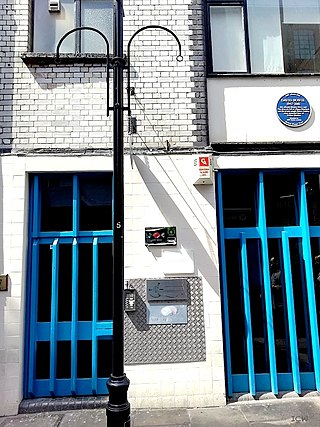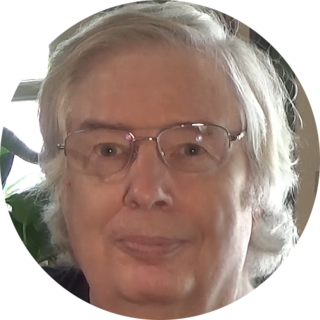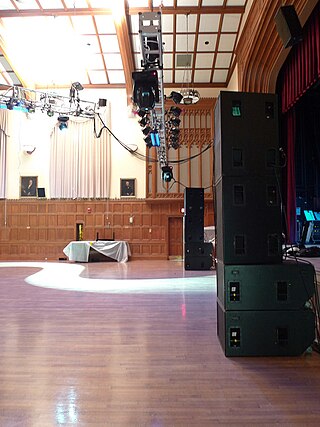Related Research Articles

A recording studio is a specialized facility for recording and mixing of instrumental or vocal musical performances, spoken words, and other sounds. They range in size from a small in-home project studio large enough to record a single singer-guitarist, to a large building with space for a full orchestra of 100 or more musicians. Ideally, both the recording and monitoring spaces are specially designed by an acoustician or audio engineer to achieve optimum acoustic properties.

A DI unit is an electronic device typically used in recording studios and in sound reinforcement systems to connect a high output impedance unbalanced output signal to a low-impedance, microphone level, balanced input, usually via an XLR connector and XLR cable. DIs are frequently used to connect an electric guitar or electric bass to a mixing console's microphone input jack. The DI performs level matching, balancing, and either active buffering or passive impedance matching/impedance bridging. DI units are typically metal boxes with input and output jacks and, for more expensive units, “ground lift” and attenuator switches.

Ken Scott is a British record producer and engineer known for being one of the five main engineers for the Beatles, as well as engineering Elton John, Pink Floyd, Procol Harum, Mahavishnu Orchestra, Duran Duran, the Jeff Beck Group, Supertramp and many more.

Trident Studios was a British recording facility, located at 17 St Anne's Court in London's Soho district between 1968 and 1981. It was constructed in 1967 by Norman Sheffield, drummer of the 1960s group the Hunters, and his brother Barry.

A Beard of Stars is the fourth studio album by English psychedelic folk band Tyrannosaurus Rex, and their last before changing their name to T. Rex. It was released in March 1970 by record label Regal Zonophone.
George Y. Massenburg is a Grammy award-winning recording engineer and inventor. Working principally in Baltimore, Los Angeles, Nashville, and Macon, Georgia, Massenburg is widely known for submitting a paper to the Audio Engineering Society in 1972 regarding the parametric equalizer.
Cherokee Studios is a recording studio facility in Hollywood founded in 1972 by members of 1960s pop band The Robbs. Cherokee has been the location of many notable recordings by such artists as Steely Dan, David Bowie, Journey, Toto, Michael Jackson, Van Halen, Guns N' Roses, The Cars, Foreigner, Tom Petty and the Heartbreakers, Devo, Queens of the Stone Age, X, Mötley Crüe, "Weird Al" Yankovic, Dokken, John Mellencamp, Melissa Etheridge, and The Replacements.

Automated Processes Inc. is an American company that designs, manufactures, and markets mixing consoles and signal processors, including modular signal processor units in the 500-series format standard that evolved from early API mixing consoles.

Distortion and overdrive are forms of audio signal processing used to alter the sound of amplified electric musical instruments, usually by increasing their gain, producing a "fuzzy", "growling", or "gritty" tone. Distortion is most commonly used with the electric guitar, but may also be used with other electric instruments such as electric bass, electric piano, synthesizer and Hammond organ. Guitarists playing electric blues originally obtained an overdriven sound by turning up their vacuum tube-powered guitar amplifiers to high volumes, which caused the signal to distort. While overdriven tube amps are still used to obtain overdrive, especially in genres like blues and rockabilly, a number of other ways to produce distortion have been developed since the 1960s, such as distortion effect pedals. The growling tone of a distorted electric guitar is a key part of many genres, including blues and many rock music genres, notably hard rock, punk rock, hardcore punk, acid rock, and heavy metal music, while the use of distorted bass has been essential in a genre of hip hop music and alternative hip hop known as "SoundCloud rap".

The studio practices of the Beatles evolved during the 1960s and, in some cases, influenced the way popular music was recorded. Some of the effects they employed were sampling, artificial double tracking (ADT) and the elaborate use of multitrack recording machines. They also used classical instruments on their recordings and guitar feedback. The group's attitude towards the recording process was summed up by Paul McCartney: "We would say, 'Try it. Just try it for us. If it sounds crappy, OK, we'll lose it. But it might just sound good.' We were always pushing ahead: Louder, further, longer, more, different."

Arthur Rupert Neve was a British-American electronics engineer and entrepreneur, who was a pioneering designer of professional audio recording equipment. He designed analog recording and audio mixing equipment that was sought after by professional musicians and recording technicians. Some of his customers were music groups The Beatles, Aerosmith and Nirvana, and recording studios Sound City Studios and Abbey Road Studios. Companies that he was associated with included Neve Electronics, Focusrite, AMS Neve, and Rupert Neve Designs.

Leon R. White is an American guitarist, author of instructional guitar books, producer, and studio musician. He is also a performer, producer, composer, software producer, and luthier. He has written and edited over 40 books including the guitar instructional books Sight to Sound and Styles for the Studio as well as co-producing the album titled Solo Guitar performed by his friend, Ted Greene.

An audio engineer helps to produce a recording or a live performance, balancing and adjusting sound sources using equalization, dynamics processing and audio effects, mixing, reproduction, and reinforcement of sound. Audio engineers work on the "technical aspect of recording—the placing of microphones, pre-amp knobs, the setting of levels. The physical recording of any project is done by an engineer... the nuts and bolts."
Trident A Range consoles were originally built by and for Trident Studios. When word spread about this revolutionary new multi-track recording console design, other studios placed their orders and Trident Audio Developments was formed. Cherokee Studios in Los Angeles was one of the early recipients of one of the first production models. David Bowie, Rod Stewart, and Frank Sinatra are among the early artists who first recorded hit records on Cherokee's first A Range console. With only 13 consoles ever built of this model, the Trident A Range has attained a near mythical status in the professional recording industry.

Music Center Incorporated (MCI) is the former name of a United States manufacturer of professional audio equipment that operated from 1955 until 1982 when it was acquired by the Sony Corporation. The company is credited with a number of world firsts: commercialising the 24-track multi-track recorder, the tape Auto Locator and in-line mixing console.

Fantasy Studios was a music recording studio in Berkeley, California, at the Zaentz Media Center, known for its recording of award-winning albums including Journey's Escape and Green Day's Dookie. Built as a private recording studio for artists on the Fantasy Records label in 1971, it was opened to the public in 1980 for recording, mixing and mastering. It was permanently closed on September 15, 2018.
Peter Watts is a designer of pro audio equipment who is recognized as a leader in his field.
The EMI REDD .17, .37 and .51 were vacuum-tube-based mixing consoles designed by EMI for their Abbey Road Studios. They were used to mix several influential albums, including most of the Beatles' albums and the first two Pink Floyd albums.

A professional audio store is a retail business that sells, and in many cases rents, sound reinforcement system equipment and PA system components used in music concerts, live shows, dance parties and speaking events. This equipment typically includes microphones, power amplifiers, electronic effects units, speaker enclosures, monitor speakers, subwoofers and audio consoles (mixers). Some professional audio stores also sell sound recording equipment, DJ equipment, lighting equipment used in nightclubs and concerts and video equipment used in events, such as video projectors and screens. Some professional audio stores rent "backline" equipment used in rock and pop shows, such as stage pianos and bass amplifiers. While professional audio stores typically focus on selling new merchandise, some stores also sell used equipment, which is often the equipment that the company has previously rented out for shows and events.
Paul Wolff is an American electronics engineer and entrepreneur, who is a designer of professional audio recording equipment. He designs recording consoles including immersive and audio mixing equipment for professional recording. He has been associated with companies including Datatronix, API, Tonelux, and Fix Audio Designs. His customers include Jim Messina, Jimmy Jam and Terry Lewis, and Startec Studios, among others.
References
- ↑ "Mixing Legends: Malcolm Toft", Sound On Sound, July 94
- ↑ "Toft Audio ATB24", Sound On Sound, February 2008
- ↑ Brian Kehew and Kevin Ryan, Recording The Beatles, Curvebender Publishing, 2006, ISBN 0-9785200-0-9, pp. 488-9
- ↑ Walt Szalva et al,"Malcolm Toft", TapeOp, Issue #26
- ↑ "Hard-Fi At The Music Mill", Sound On Sound, December 2006
- ↑ "South Devon music legend becomes a professor" Archived 2011-10-08 at the Wayback Machine , People's Republic of South Devon, January 2009
- ↑ The Music Mill, March 2011
- ↑ "The Bassics Pre- Amplifier for Bass Guitars - Bassics". Bassics. Retrieved 1 September 2017.
- ↑ Malcolm Toft: Album Credits on AlbumCredits.com